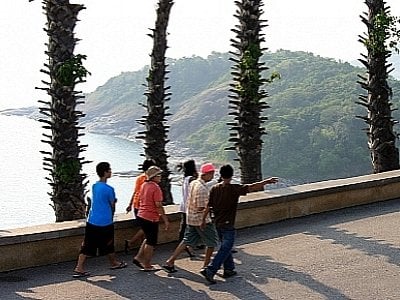Phuket guides call for action over Korean, Russian rivals

PHUKET: A Phuket provincial sub-committee has been formed to tackle the issue of illegal guides from Russia and Korea working in the local tourism industry.
Phuket Vice Governor Nivit Aroonrat on Tuesday chaired a provincial committee meeting aimed at tackling a variety of tourist rip-offs.
The gathering followed a visit to Phuket by the Interior Ministry in May when officials called on all relevant local authorities to study various ways tourists are cheated here, and to develop prevention plans.
Four sub-committees, comprising government and private-sector representatives, were given 15 days to list problems in each of four areas:
1. Public transport, such as illegal black plate taxis and scandalous tuk-tuk fares
2. Deceptive and threatening sales tactics, such as those used by some timeshare operators
3. Use of illegal guides and other unfair practices by tour operators
4. Environmental issues
One long-standing problem raised was the high number of Koreans and Russians working illegally as tour guides, a profession restricted by law to Thai nationals.
“I was told by many professional tour guides that there are many legal Thai guides in Phuket who have the ability to speak Korean or Russian, but they are rejected by foreign tour operators who claim their language skills don’t allow them to communicate effectively with their clients,” said Buayan Suwanmanee, director of the Phuket Office of Tourism and Sports.
Panompol Thammachart-Niyom, president of the Phuket Guide Association (PGA), offered another reason why the Korean and Russian tour operators do not want to hire Thai guides.
“Even if it is cheaper to hire legally-registered Thai guides, they hope to gain other benefits by hiring guides with the same nationality. The tour operators have bargaining power. They can rely on these illegal foreign guides to do their bidding since the foreign guides do not have work permits,” he explained.
“The tour operators can force the illegal foreign guides to take the tourists to visit and shop in places owned by Koreans and Russians, so money inflows are circulated among foreigners, not Thais,” he added.
Mr Panompol asked for legal action from related government authorities to help solve this problem.
“The government agencies can proceed with legal action, implicating ‘sitting guides’ and their employers,” he said.
“Sitting guide” is the term used locally to refer to accredited Thai guides who accompany tour groups in order to ensure compliance with the law, but who in fact have little or no direct contact with guests.
“I would like to ask the Tourism Authority of Thailand’s Guide Registration Office to take serious action on these issues, which have gone unresolved for over a decade now. We have set up many committees in past years to tackle these problems, but they lacked the serious approach needed to get the job done,” he said.
Latest Thailand News
Follow The Thaiger on Google News:


























